Centrica PLC: Culture, Motivation, and Team Dynamics in Organisation
VerifiedAdded on 2023/06/05
|14
|4726
|134
Report
AI Summary
This report provides a comprehensive analysis of organizational behaviour, focusing on the influence of culture, politics, and power on individual and team performance within the context of Centrica PLC, a British multinational energy and services company. It evaluates content and process theories of motivation, such as Maslow's hierarchy of needs and expectancy theory, and their application in achieving organizational goals. The report also examines the characteristics of effective versus ineffective teams and explores relevant team and group development theories to foster cooperation. Furthermore, it delves into how concepts and philosophies of organizational behaviour inform and influence behavior within a given business situation, ultimately aiming to improve business performance and productivity. The analysis includes critical evaluations and recommendations for leveraging culture, politics, power, and motivation to drive team and organizational success.
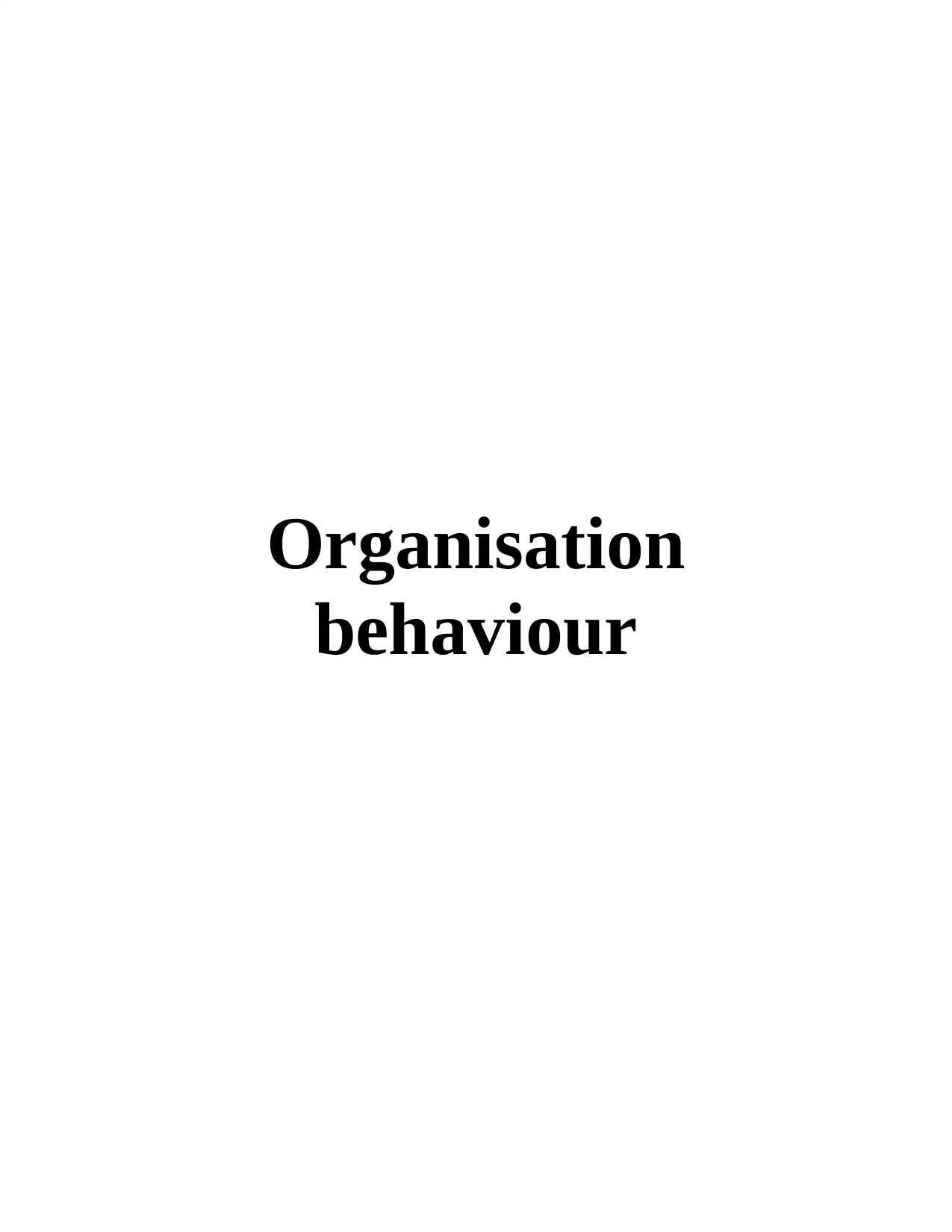
Organisation
behaviour
behaviour
Paraphrase This Document
Need a fresh take? Get an instant paraphrase of this document with our AI Paraphraser
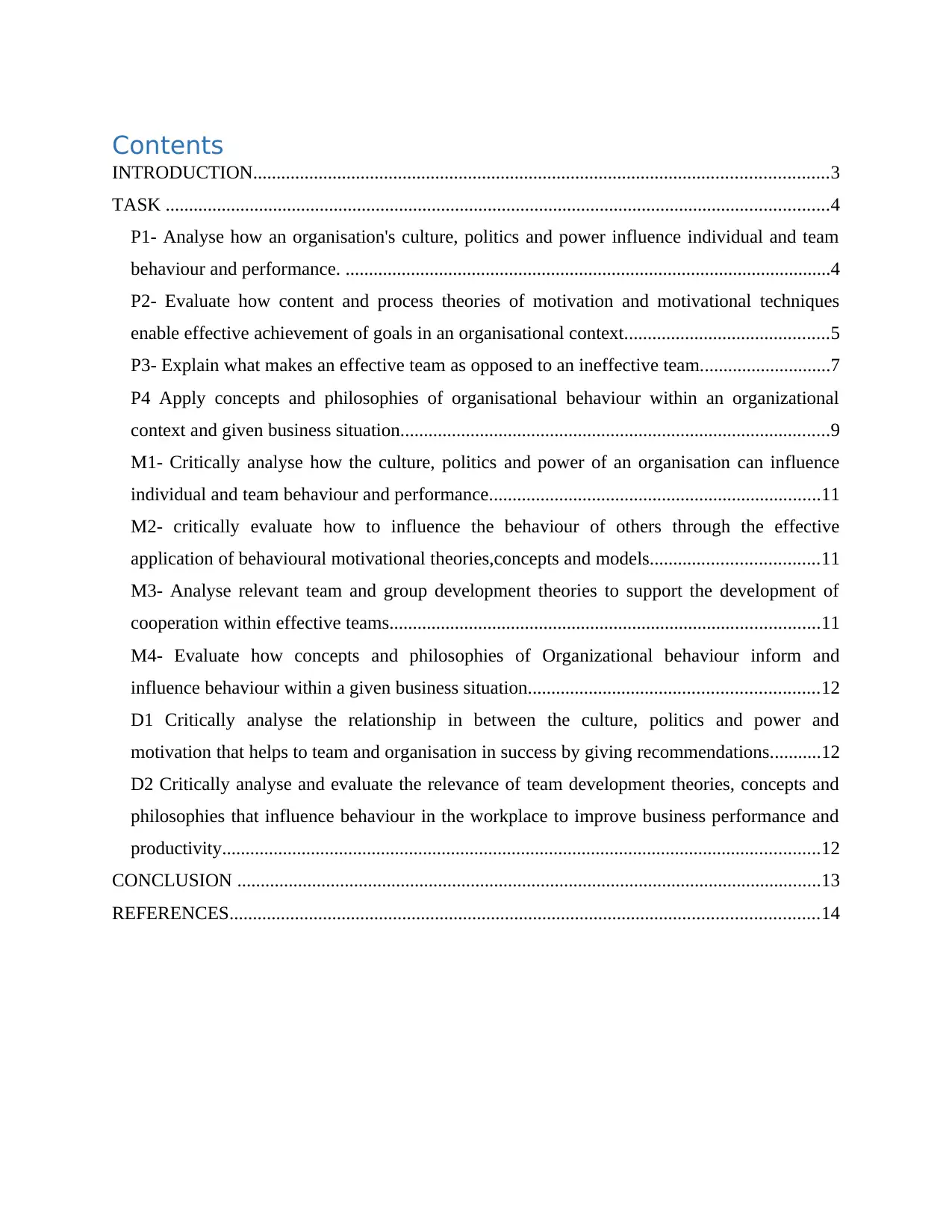
Contents
INTRODUCTION...........................................................................................................................3
TASK ..............................................................................................................................................4
P1- Analyse how an organisation's culture, politics and power influence individual and team
behaviour and performance. ........................................................................................................4
P2- Evaluate how content and process theories of motivation and motivational techniques
enable effective achievement of goals in an organisational context............................................5
P3- Explain what makes an effective team as opposed to an ineffective team............................7
P4 Apply concepts and philosophies of organisational behaviour within an organizational
context and given business situation............................................................................................9
M1- Critically analyse how the culture, politics and power of an organisation can influence
individual and team behaviour and performance.......................................................................11
M2- critically evaluate how to influence the behaviour of others through the effective
application of behavioural motivational theories,concepts and models....................................11
M3- Analyse relevant team and group development theories to support the development of
cooperation within effective teams............................................................................................11
M4- Evaluate how concepts and philosophies of Organizational behaviour inform and
influence behaviour within a given business situation..............................................................12
D1 Critically analyse the relationship in between the culture, politics and power and
motivation that helps to team and organisation in success by giving recommendations...........12
D2 Critically analyse and evaluate the relevance of team development theories, concepts and
philosophies that influence behaviour in the workplace to improve business performance and
productivity................................................................................................................................12
CONCLUSION .............................................................................................................................13
REFERENCES..............................................................................................................................14
INTRODUCTION...........................................................................................................................3
TASK ..............................................................................................................................................4
P1- Analyse how an organisation's culture, politics and power influence individual and team
behaviour and performance. ........................................................................................................4
P2- Evaluate how content and process theories of motivation and motivational techniques
enable effective achievement of goals in an organisational context............................................5
P3- Explain what makes an effective team as opposed to an ineffective team............................7
P4 Apply concepts and philosophies of organisational behaviour within an organizational
context and given business situation............................................................................................9
M1- Critically analyse how the culture, politics and power of an organisation can influence
individual and team behaviour and performance.......................................................................11
M2- critically evaluate how to influence the behaviour of others through the effective
application of behavioural motivational theories,concepts and models....................................11
M3- Analyse relevant team and group development theories to support the development of
cooperation within effective teams............................................................................................11
M4- Evaluate how concepts and philosophies of Organizational behaviour inform and
influence behaviour within a given business situation..............................................................12
D1 Critically analyse the relationship in between the culture, politics and power and
motivation that helps to team and organisation in success by giving recommendations...........12
D2 Critically analyse and evaluate the relevance of team development theories, concepts and
philosophies that influence behaviour in the workplace to improve business performance and
productivity................................................................................................................................12
CONCLUSION .............................................................................................................................13
REFERENCES..............................................................................................................................14
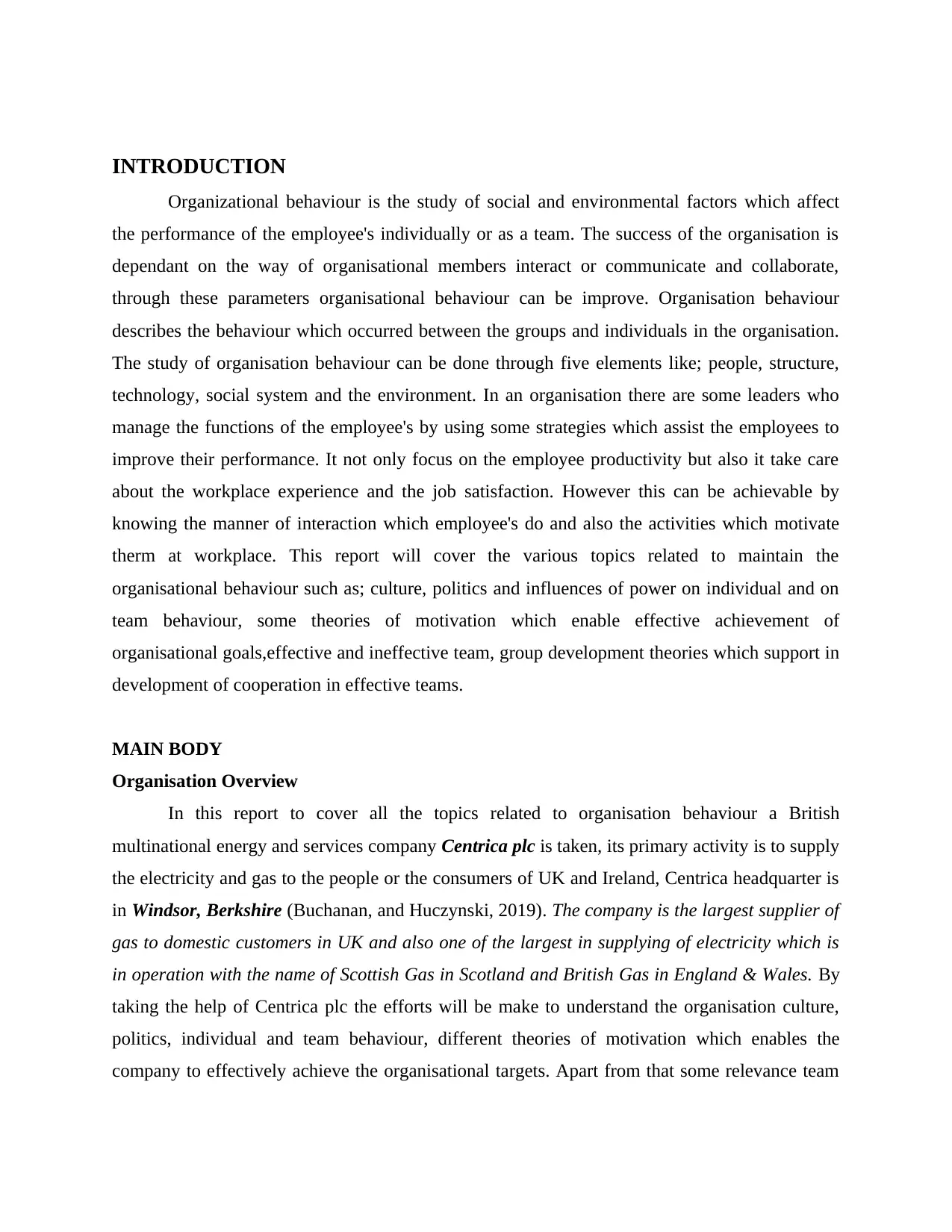
INTRODUCTION
Organizational behaviour is the study of social and environmental factors which affect
the performance of the employee's individually or as a team. The success of the organisation is
dependant on the way of organisational members interact or communicate and collaborate,
through these parameters organisational behaviour can be improve. Organisation behaviour
describes the behaviour which occurred between the groups and individuals in the organisation.
The study of organisation behaviour can be done through five elements like; people, structure,
technology, social system and the environment. In an organisation there are some leaders who
manage the functions of the employee's by using some strategies which assist the employees to
improve their performance. It not only focus on the employee productivity but also it take care
about the workplace experience and the job satisfaction. However this can be achievable by
knowing the manner of interaction which employee's do and also the activities which motivate
therm at workplace. This report will cover the various topics related to maintain the
organisational behaviour such as; culture, politics and influences of power on individual and on
team behaviour, some theories of motivation which enable effective achievement of
organisational goals,effective and ineffective team, group development theories which support in
development of cooperation in effective teams.
MAIN BODY
Organisation Overview
In this report to cover all the topics related to organisation behaviour a British
multinational energy and services company Centrica plc is taken, its primary activity is to supply
the electricity and gas to the people or the consumers of UK and Ireland, Centrica headquarter is
in Windsor, Berkshire (Buchanan, and Huczynski, 2019). The company is the largest supplier of
gas to domestic customers in UK and also one of the largest in supplying of electricity which is
in operation with the name of Scottish Gas in Scotland and British Gas in England & Wales. By
taking the help of Centrica plc the efforts will be make to understand the organisation culture,
politics, individual and team behaviour, different theories of motivation which enables the
company to effectively achieve the organisational targets. Apart from that some relevance team
Organizational behaviour is the study of social and environmental factors which affect
the performance of the employee's individually or as a team. The success of the organisation is
dependant on the way of organisational members interact or communicate and collaborate,
through these parameters organisational behaviour can be improve. Organisation behaviour
describes the behaviour which occurred between the groups and individuals in the organisation.
The study of organisation behaviour can be done through five elements like; people, structure,
technology, social system and the environment. In an organisation there are some leaders who
manage the functions of the employee's by using some strategies which assist the employees to
improve their performance. It not only focus on the employee productivity but also it take care
about the workplace experience and the job satisfaction. However this can be achievable by
knowing the manner of interaction which employee's do and also the activities which motivate
therm at workplace. This report will cover the various topics related to maintain the
organisational behaviour such as; culture, politics and influences of power on individual and on
team behaviour, some theories of motivation which enable effective achievement of
organisational goals,effective and ineffective team, group development theories which support in
development of cooperation in effective teams.
MAIN BODY
Organisation Overview
In this report to cover all the topics related to organisation behaviour a British
multinational energy and services company Centrica plc is taken, its primary activity is to supply
the electricity and gas to the people or the consumers of UK and Ireland, Centrica headquarter is
in Windsor, Berkshire (Buchanan, and Huczynski, 2019). The company is the largest supplier of
gas to domestic customers in UK and also one of the largest in supplying of electricity which is
in operation with the name of Scottish Gas in Scotland and British Gas in England & Wales. By
taking the help of Centrica plc the efforts will be make to understand the organisation culture,
politics, individual and team behaviour, different theories of motivation which enables the
company to effectively achieve the organisational targets. Apart from that some relevance team
⊘ This is a preview!⊘
Do you want full access?
Subscribe today to unlock all pages.

Trusted by 1+ million students worldwide
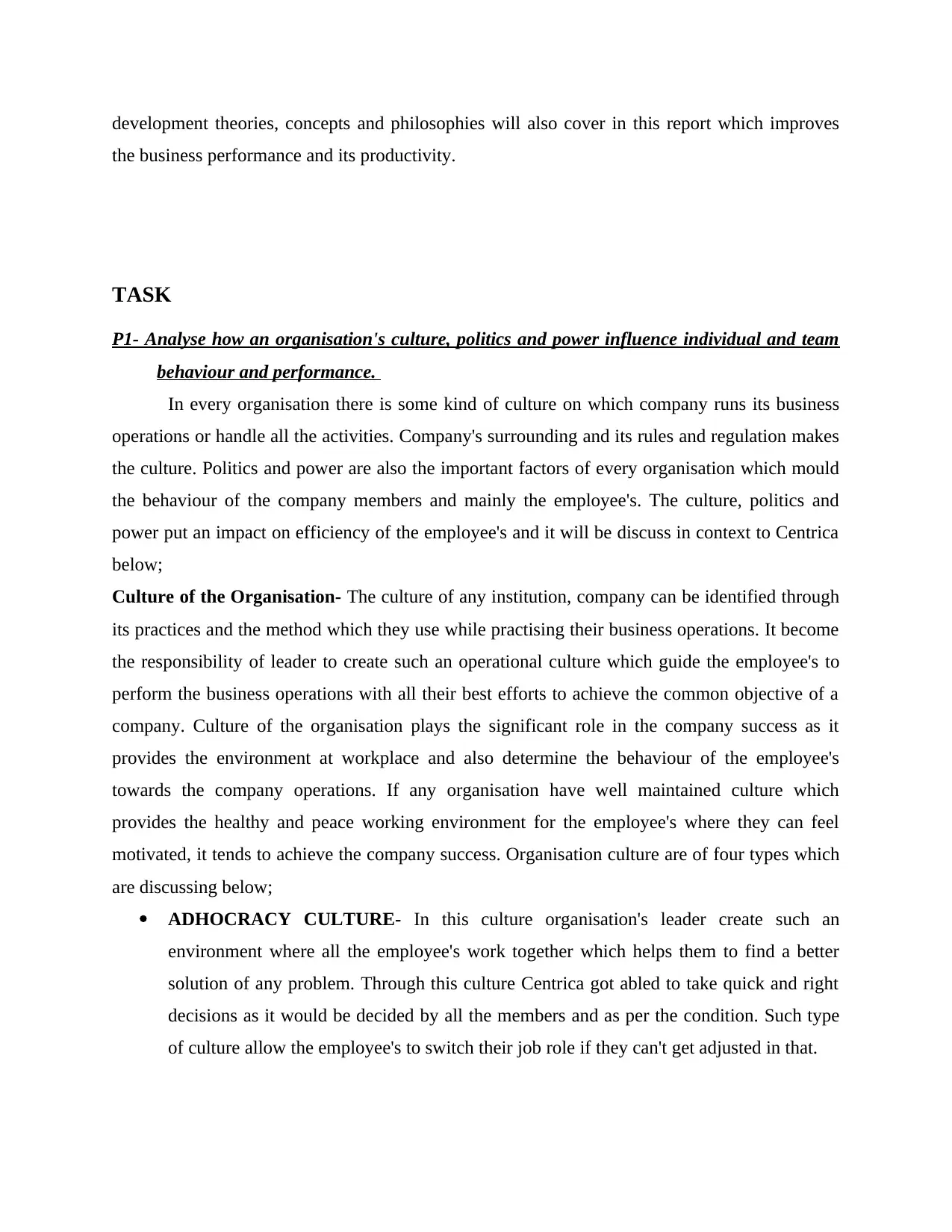
development theories, concepts and philosophies will also cover in this report which improves
the business performance and its productivity.
TASK
P1- Analyse how an organisation's culture, politics and power influence individual and team
behaviour and performance.
In every organisation there is some kind of culture on which company runs its business
operations or handle all the activities. Company's surrounding and its rules and regulation makes
the culture. Politics and power are also the important factors of every organisation which mould
the behaviour of the company members and mainly the employee's. The culture, politics and
power put an impact on efficiency of the employee's and it will be discuss in context to Centrica
below;
Culture of the Organisation- The culture of any institution, company can be identified through
its practices and the method which they use while practising their business operations. It become
the responsibility of leader to create such an operational culture which guide the employee's to
perform the business operations with all their best efforts to achieve the common objective of a
company. Culture of the organisation plays the significant role in the company success as it
provides the environment at workplace and also determine the behaviour of the employee's
towards the company operations. If any organisation have well maintained culture which
provides the healthy and peace working environment for the employee's where they can feel
motivated, it tends to achieve the company success. Organisation culture are of four types which
are discussing below;
ADHOCRACY CULTURE- In this culture organisation's leader create such an
environment where all the employee's work together which helps them to find a better
solution of any problem. Through this culture Centrica got abled to take quick and right
decisions as it would be decided by all the members and as per the condition. Such type
of culture allow the employee's to switch their job role if they can't get adjusted in that.
the business performance and its productivity.
TASK
P1- Analyse how an organisation's culture, politics and power influence individual and team
behaviour and performance.
In every organisation there is some kind of culture on which company runs its business
operations or handle all the activities. Company's surrounding and its rules and regulation makes
the culture. Politics and power are also the important factors of every organisation which mould
the behaviour of the company members and mainly the employee's. The culture, politics and
power put an impact on efficiency of the employee's and it will be discuss in context to Centrica
below;
Culture of the Organisation- The culture of any institution, company can be identified through
its practices and the method which they use while practising their business operations. It become
the responsibility of leader to create such an operational culture which guide the employee's to
perform the business operations with all their best efforts to achieve the common objective of a
company. Culture of the organisation plays the significant role in the company success as it
provides the environment at workplace and also determine the behaviour of the employee's
towards the company operations. If any organisation have well maintained culture which
provides the healthy and peace working environment for the employee's where they can feel
motivated, it tends to achieve the company success. Organisation culture are of four types which
are discussing below;
ADHOCRACY CULTURE- In this culture organisation's leader create such an
environment where all the employee's work together which helps them to find a better
solution of any problem. Through this culture Centrica got abled to take quick and right
decisions as it would be decided by all the members and as per the condition. Such type
of culture allow the employee's to switch their job role if they can't get adjusted in that.
Paraphrase This Document
Need a fresh take? Get an instant paraphrase of this document with our AI Paraphraser
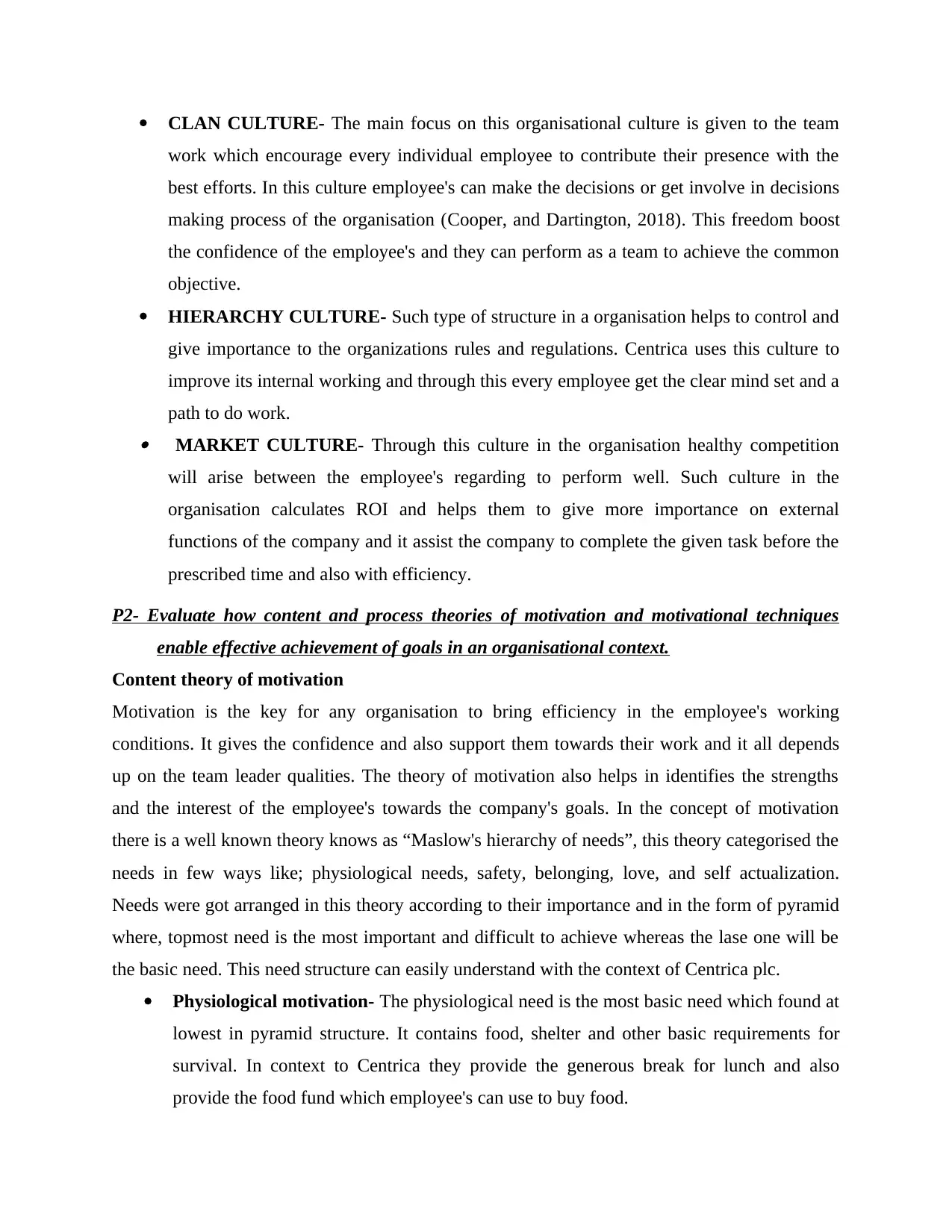
CLAN CULTURE- The main focus on this organisational culture is given to the team
work which encourage every individual employee to contribute their presence with the
best efforts. In this culture employee's can make the decisions or get involve in decisions
making process of the organisation (Cooper, and Dartington, 2018). This freedom boost
the confidence of the employee's and they can perform as a team to achieve the common
objective.
HIERARCHY CULTURE- Such type of structure in a organisation helps to control and
give importance to the organizations rules and regulations. Centrica uses this culture to
improve its internal working and through this every employee get the clear mind set and a
path to do work. MARKET CULTURE- Through this culture in the organisation healthy competition
will arise between the employee's regarding to perform well. Such culture in the
organisation calculates ROI and helps them to give more importance on external
functions of the company and it assist the company to complete the given task before the
prescribed time and also with efficiency.
P2- Evaluate how content and process theories of motivation and motivational techniques
enable effective achievement of goals in an organisational context.
Content theory of motivation
Motivation is the key for any organisation to bring efficiency in the employee's working
conditions. It gives the confidence and also support them towards their work and it all depends
up on the team leader qualities. The theory of motivation also helps in identifies the strengths
and the interest of the employee's towards the company's goals. In the concept of motivation
there is a well known theory knows as “Maslow's hierarchy of needs”, this theory categorised the
needs in few ways like; physiological needs, safety, belonging, love, and self actualization.
Needs were got arranged in this theory according to their importance and in the form of pyramid
where, topmost need is the most important and difficult to achieve whereas the lase one will be
the basic need. This need structure can easily understand with the context of Centrica plc.
Physiological motivation- The physiological need is the most basic need which found at
lowest in pyramid structure. It contains food, shelter and other basic requirements for
survival. In context to Centrica they provide the generous break for lunch and also
provide the food fund which employee's can use to buy food.
work which encourage every individual employee to contribute their presence with the
best efforts. In this culture employee's can make the decisions or get involve in decisions
making process of the organisation (Cooper, and Dartington, 2018). This freedom boost
the confidence of the employee's and they can perform as a team to achieve the common
objective.
HIERARCHY CULTURE- Such type of structure in a organisation helps to control and
give importance to the organizations rules and regulations. Centrica uses this culture to
improve its internal working and through this every employee get the clear mind set and a
path to do work. MARKET CULTURE- Through this culture in the organisation healthy competition
will arise between the employee's regarding to perform well. Such culture in the
organisation calculates ROI and helps them to give more importance on external
functions of the company and it assist the company to complete the given task before the
prescribed time and also with efficiency.
P2- Evaluate how content and process theories of motivation and motivational techniques
enable effective achievement of goals in an organisational context.
Content theory of motivation
Motivation is the key for any organisation to bring efficiency in the employee's working
conditions. It gives the confidence and also support them towards their work and it all depends
up on the team leader qualities. The theory of motivation also helps in identifies the strengths
and the interest of the employee's towards the company's goals. In the concept of motivation
there is a well known theory knows as “Maslow's hierarchy of needs”, this theory categorised the
needs in few ways like; physiological needs, safety, belonging, love, and self actualization.
Needs were got arranged in this theory according to their importance and in the form of pyramid
where, topmost need is the most important and difficult to achieve whereas the lase one will be
the basic need. This need structure can easily understand with the context of Centrica plc.
Physiological motivation- The physiological need is the most basic need which found at
lowest in pyramid structure. It contains food, shelter and other basic requirements for
survival. In context to Centrica they provide the generous break for lunch and also
provide the food fund which employee's can use to buy food.
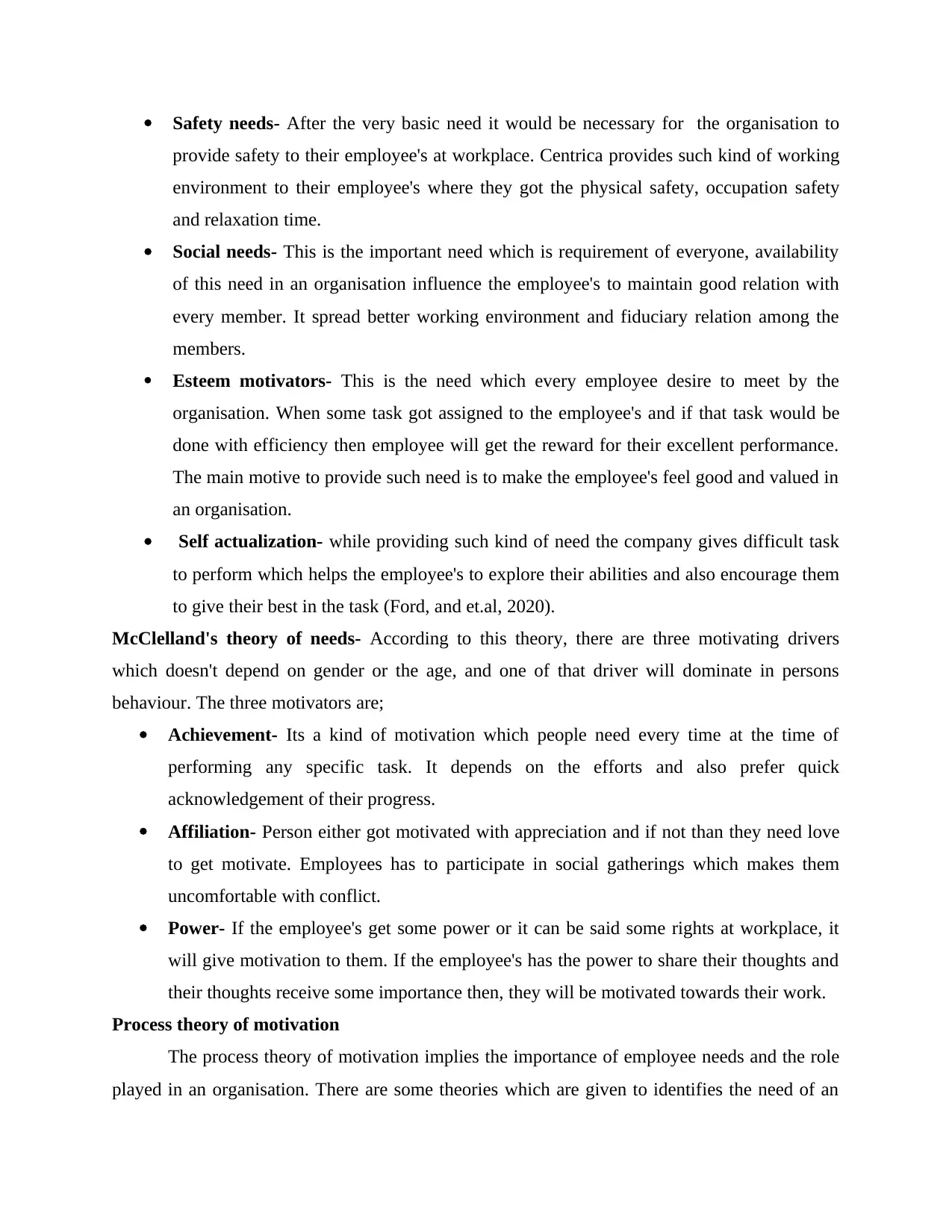
Safety needs- After the very basic need it would be necessary for the organisation to
provide safety to their employee's at workplace. Centrica provides such kind of working
environment to their employee's where they got the physical safety, occupation safety
and relaxation time.
Social needs- This is the important need which is requirement of everyone, availability
of this need in an organisation influence the employee's to maintain good relation with
every member. It spread better working environment and fiduciary relation among the
members.
Esteem motivators- This is the need which every employee desire to meet by the
organisation. When some task got assigned to the employee's and if that task would be
done with efficiency then employee will get the reward for their excellent performance.
The main motive to provide such need is to make the employee's feel good and valued in
an organisation.
Self actualization- while providing such kind of need the company gives difficult task
to perform which helps the employee's to explore their abilities and also encourage them
to give their best in the task (Ford, and et.al, 2020).
McClelland's theory of needs- According to this theory, there are three motivating drivers
which doesn't depend on gender or the age, and one of that driver will dominate in persons
behaviour. The three motivators are;
Achievement- Its a kind of motivation which people need every time at the time of
performing any specific task. It depends on the efforts and also prefer quick
acknowledgement of their progress.
Affiliation- Person either got motivated with appreciation and if not than they need love
to get motivate. Employees has to participate in social gatherings which makes them
uncomfortable with conflict.
Power- If the employee's get some power or it can be said some rights at workplace, it
will give motivation to them. If the employee's has the power to share their thoughts and
their thoughts receive some importance then, they will be motivated towards their work.
Process theory of motivation
The process theory of motivation implies the importance of employee needs and the role
played in an organisation. There are some theories which are given to identifies the need of an
provide safety to their employee's at workplace. Centrica provides such kind of working
environment to their employee's where they got the physical safety, occupation safety
and relaxation time.
Social needs- This is the important need which is requirement of everyone, availability
of this need in an organisation influence the employee's to maintain good relation with
every member. It spread better working environment and fiduciary relation among the
members.
Esteem motivators- This is the need which every employee desire to meet by the
organisation. When some task got assigned to the employee's and if that task would be
done with efficiency then employee will get the reward for their excellent performance.
The main motive to provide such need is to make the employee's feel good and valued in
an organisation.
Self actualization- while providing such kind of need the company gives difficult task
to perform which helps the employee's to explore their abilities and also encourage them
to give their best in the task (Ford, and et.al, 2020).
McClelland's theory of needs- According to this theory, there are three motivating drivers
which doesn't depend on gender or the age, and one of that driver will dominate in persons
behaviour. The three motivators are;
Achievement- Its a kind of motivation which people need every time at the time of
performing any specific task. It depends on the efforts and also prefer quick
acknowledgement of their progress.
Affiliation- Person either got motivated with appreciation and if not than they need love
to get motivate. Employees has to participate in social gatherings which makes them
uncomfortable with conflict.
Power- If the employee's get some power or it can be said some rights at workplace, it
will give motivation to them. If the employee's has the power to share their thoughts and
their thoughts receive some importance then, they will be motivated towards their work.
Process theory of motivation
The process theory of motivation implies the importance of employee needs and the role
played in an organisation. There are some theories which are given to identifies the need of an
⊘ This is a preview!⊘
Do you want full access?
Subscribe today to unlock all pages.

Trusted by 1+ million students worldwide
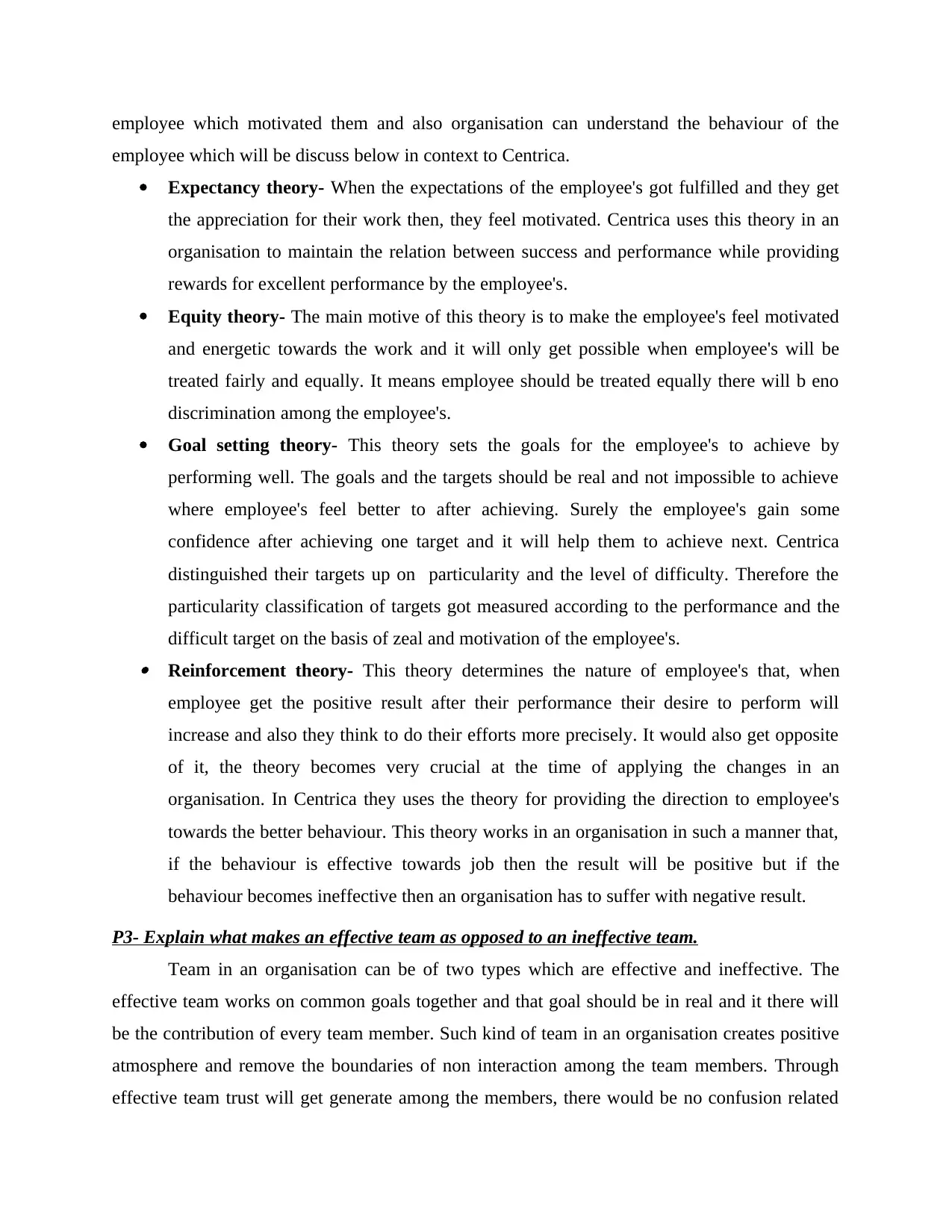
employee which motivated them and also organisation can understand the behaviour of the
employee which will be discuss below in context to Centrica.
Expectancy theory- When the expectations of the employee's got fulfilled and they get
the appreciation for their work then, they feel motivated. Centrica uses this theory in an
organisation to maintain the relation between success and performance while providing
rewards for excellent performance by the employee's.
Equity theory- The main motive of this theory is to make the employee's feel motivated
and energetic towards the work and it will only get possible when employee's will be
treated fairly and equally. It means employee should be treated equally there will b eno
discrimination among the employee's.
Goal setting theory- This theory sets the goals for the employee's to achieve by
performing well. The goals and the targets should be real and not impossible to achieve
where employee's feel better to after achieving. Surely the employee's gain some
confidence after achieving one target and it will help them to achieve next. Centrica
distinguished their targets up on particularity and the level of difficulty. Therefore the
particularity classification of targets got measured according to the performance and the
difficult target on the basis of zeal and motivation of the employee's. Reinforcement theory- This theory determines the nature of employee's that, when
employee get the positive result after their performance their desire to perform will
increase and also they think to do their efforts more precisely. It would also get opposite
of it, the theory becomes very crucial at the time of applying the changes in an
organisation. In Centrica they uses the theory for providing the direction to employee's
towards the better behaviour. This theory works in an organisation in such a manner that,
if the behaviour is effective towards job then the result will be positive but if the
behaviour becomes ineffective then an organisation has to suffer with negative result.
P3- Explain what makes an effective team as opposed to an ineffective team.
Team in an organisation can be of two types which are effective and ineffective. The
effective team works on common goals together and that goal should be in real and it there will
be the contribution of every team member. Such kind of team in an organisation creates positive
atmosphere and remove the boundaries of non interaction among the team members. Through
effective team trust will get generate among the members, there would be no confusion related
employee which will be discuss below in context to Centrica.
Expectancy theory- When the expectations of the employee's got fulfilled and they get
the appreciation for their work then, they feel motivated. Centrica uses this theory in an
organisation to maintain the relation between success and performance while providing
rewards for excellent performance by the employee's.
Equity theory- The main motive of this theory is to make the employee's feel motivated
and energetic towards the work and it will only get possible when employee's will be
treated fairly and equally. It means employee should be treated equally there will b eno
discrimination among the employee's.
Goal setting theory- This theory sets the goals for the employee's to achieve by
performing well. The goals and the targets should be real and not impossible to achieve
where employee's feel better to after achieving. Surely the employee's gain some
confidence after achieving one target and it will help them to achieve next. Centrica
distinguished their targets up on particularity and the level of difficulty. Therefore the
particularity classification of targets got measured according to the performance and the
difficult target on the basis of zeal and motivation of the employee's. Reinforcement theory- This theory determines the nature of employee's that, when
employee get the positive result after their performance their desire to perform will
increase and also they think to do their efforts more precisely. It would also get opposite
of it, the theory becomes very crucial at the time of applying the changes in an
organisation. In Centrica they uses the theory for providing the direction to employee's
towards the better behaviour. This theory works in an organisation in such a manner that,
if the behaviour is effective towards job then the result will be positive but if the
behaviour becomes ineffective then an organisation has to suffer with negative result.
P3- Explain what makes an effective team as opposed to an ineffective team.
Team in an organisation can be of two types which are effective and ineffective. The
effective team works on common goals together and that goal should be in real and it there will
be the contribution of every team member. Such kind of team in an organisation creates positive
atmosphere and remove the boundaries of non interaction among the team members. Through
effective team trust will get generate among the members, there would be no confusion related
Paraphrase This Document
Need a fresh take? Get an instant paraphrase of this document with our AI Paraphraser
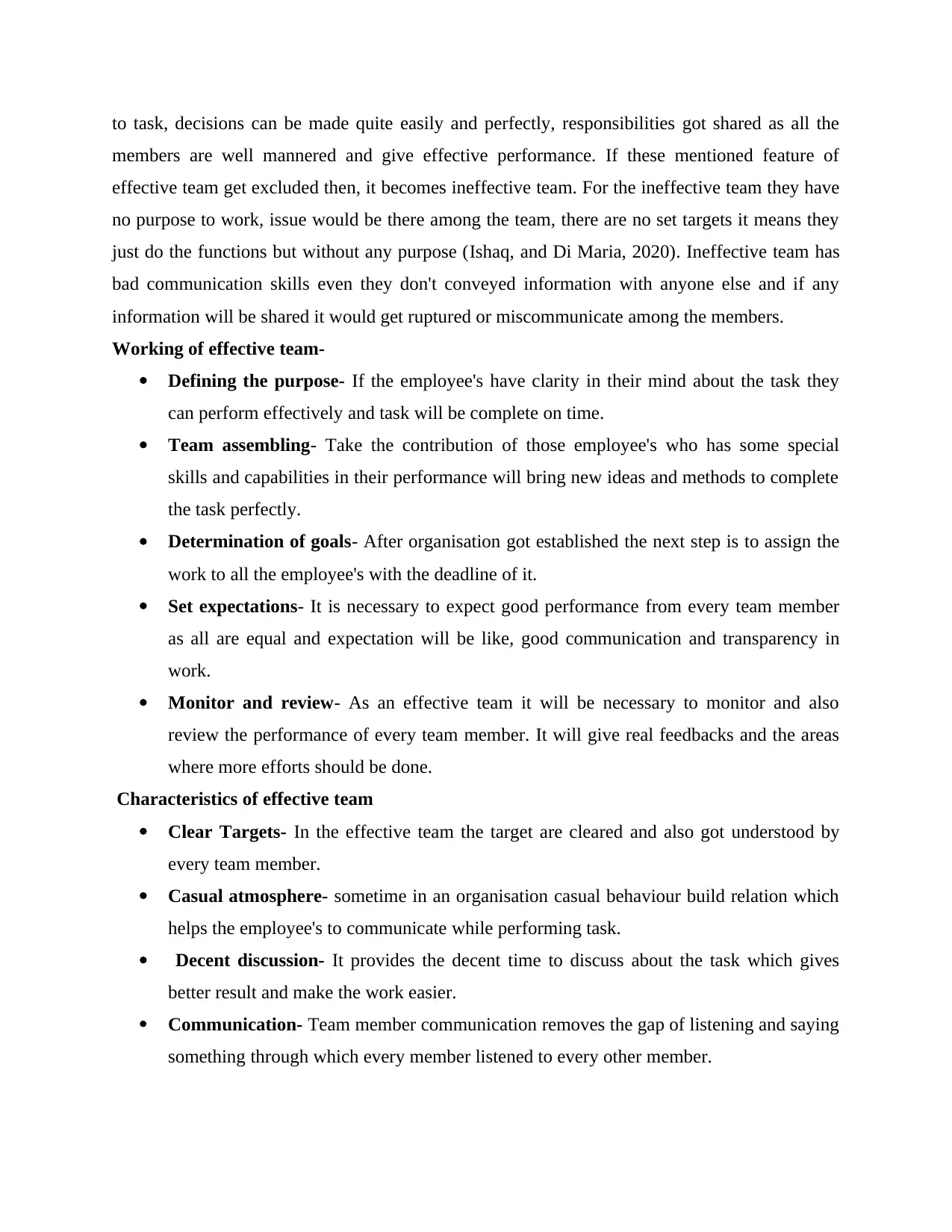
to task, decisions can be made quite easily and perfectly, responsibilities got shared as all the
members are well mannered and give effective performance. If these mentioned feature of
effective team get excluded then, it becomes ineffective team. For the ineffective team they have
no purpose to work, issue would be there among the team, there are no set targets it means they
just do the functions but without any purpose (Ishaq, and Di Maria, 2020). Ineffective team has
bad communication skills even they don't conveyed information with anyone else and if any
information will be shared it would get ruptured or miscommunicate among the members.
Working of effective team-
Defining the purpose- If the employee's have clarity in their mind about the task they
can perform effectively and task will be complete on time.
Team assembling- Take the contribution of those employee's who has some special
skills and capabilities in their performance will bring new ideas and methods to complete
the task perfectly.
Determination of goals- After organisation got established the next step is to assign the
work to all the employee's with the deadline of it.
Set expectations- It is necessary to expect good performance from every team member
as all are equal and expectation will be like, good communication and transparency in
work.
Monitor and review- As an effective team it will be necessary to monitor and also
review the performance of every team member. It will give real feedbacks and the areas
where more efforts should be done.
Characteristics of effective team
Clear Targets- In the effective team the target are cleared and also got understood by
every team member.
Casual atmosphere- sometime in an organisation casual behaviour build relation which
helps the employee's to communicate while performing task.
Decent discussion- It provides the decent time to discuss about the task which gives
better result and make the work easier.
Communication- Team member communication removes the gap of listening and saying
something through which every member listened to every other member.
members are well mannered and give effective performance. If these mentioned feature of
effective team get excluded then, it becomes ineffective team. For the ineffective team they have
no purpose to work, issue would be there among the team, there are no set targets it means they
just do the functions but without any purpose (Ishaq, and Di Maria, 2020). Ineffective team has
bad communication skills even they don't conveyed information with anyone else and if any
information will be shared it would get ruptured or miscommunicate among the members.
Working of effective team-
Defining the purpose- If the employee's have clarity in their mind about the task they
can perform effectively and task will be complete on time.
Team assembling- Take the contribution of those employee's who has some special
skills and capabilities in their performance will bring new ideas and methods to complete
the task perfectly.
Determination of goals- After organisation got established the next step is to assign the
work to all the employee's with the deadline of it.
Set expectations- It is necessary to expect good performance from every team member
as all are equal and expectation will be like, good communication and transparency in
work.
Monitor and review- As an effective team it will be necessary to monitor and also
review the performance of every team member. It will give real feedbacks and the areas
where more efforts should be done.
Characteristics of effective team
Clear Targets- In the effective team the target are cleared and also got understood by
every team member.
Casual atmosphere- sometime in an organisation casual behaviour build relation which
helps the employee's to communicate while performing task.
Decent discussion- It provides the decent time to discuss about the task which gives
better result and make the work easier.
Communication- Team member communication removes the gap of listening and saying
something through which every member listened to every other member.
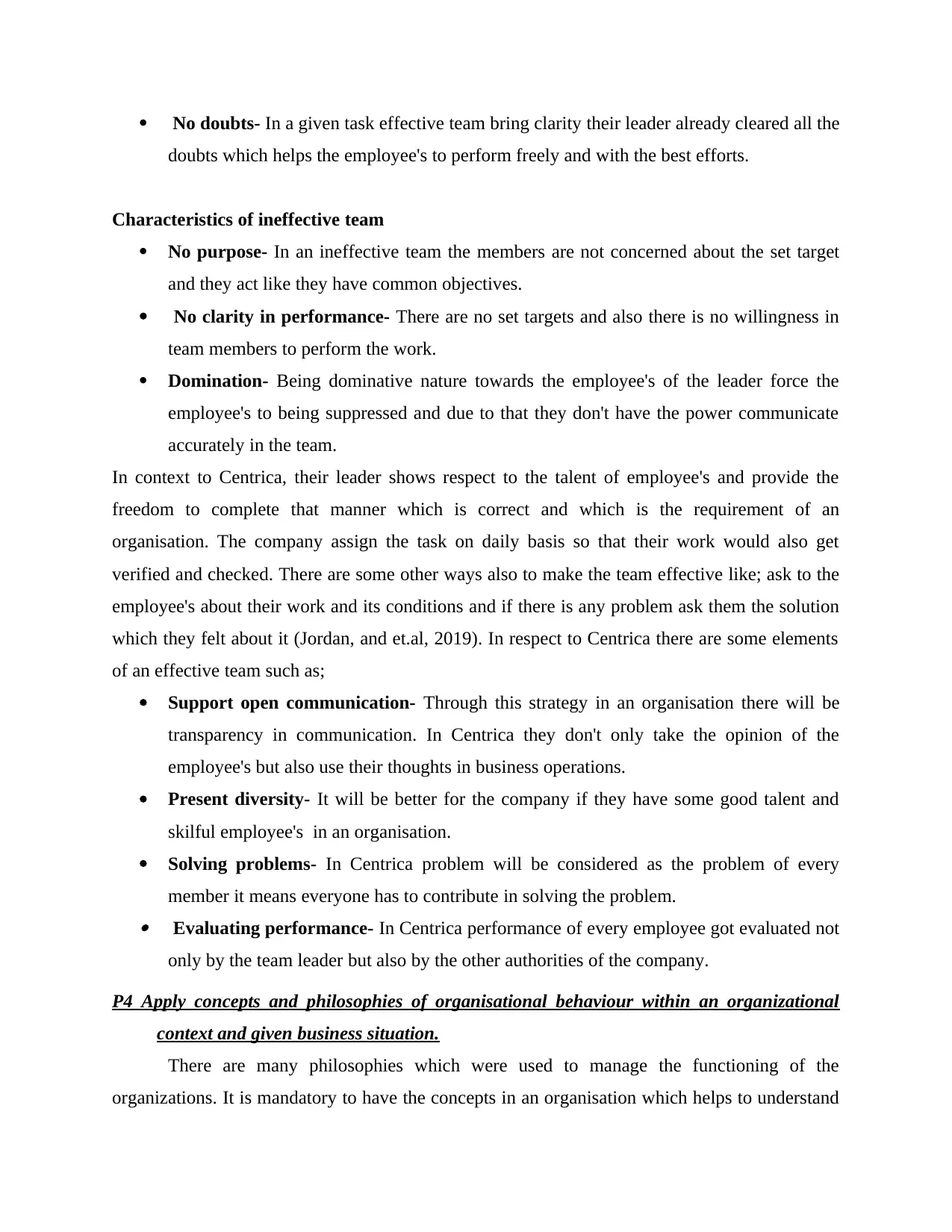
No doubts- In a given task effective team bring clarity their leader already cleared all the
doubts which helps the employee's to perform freely and with the best efforts.
Characteristics of ineffective team
No purpose- In an ineffective team the members are not concerned about the set target
and they act like they have common objectives.
No clarity in performance- There are no set targets and also there is no willingness in
team members to perform the work.
Domination- Being dominative nature towards the employee's of the leader force the
employee's to being suppressed and due to that they don't have the power communicate
accurately in the team.
In context to Centrica, their leader shows respect to the talent of employee's and provide the
freedom to complete that manner which is correct and which is the requirement of an
organisation. The company assign the task on daily basis so that their work would also get
verified and checked. There are some other ways also to make the team effective like; ask to the
employee's about their work and its conditions and if there is any problem ask them the solution
which they felt about it (Jordan, and et.al, 2019). In respect to Centrica there are some elements
of an effective team such as;
Support open communication- Through this strategy in an organisation there will be
transparency in communication. In Centrica they don't only take the opinion of the
employee's but also use their thoughts in business operations.
Present diversity- It will be better for the company if they have some good talent and
skilful employee's in an organisation.
Solving problems- In Centrica problem will be considered as the problem of every
member it means everyone has to contribute in solving the problem. Evaluating performance- In Centrica performance of every employee got evaluated not
only by the team leader but also by the other authorities of the company.
P4 Apply concepts and philosophies of organisational behaviour within an organizational
context and given business situation.
There are many philosophies which were used to manage the functioning of the
organizations. It is mandatory to have the concepts in an organisation which helps to understand
doubts which helps the employee's to perform freely and with the best efforts.
Characteristics of ineffective team
No purpose- In an ineffective team the members are not concerned about the set target
and they act like they have common objectives.
No clarity in performance- There are no set targets and also there is no willingness in
team members to perform the work.
Domination- Being dominative nature towards the employee's of the leader force the
employee's to being suppressed and due to that they don't have the power communicate
accurately in the team.
In context to Centrica, their leader shows respect to the talent of employee's and provide the
freedom to complete that manner which is correct and which is the requirement of an
organisation. The company assign the task on daily basis so that their work would also get
verified and checked. There are some other ways also to make the team effective like; ask to the
employee's about their work and its conditions and if there is any problem ask them the solution
which they felt about it (Jordan, and et.al, 2019). In respect to Centrica there are some elements
of an effective team such as;
Support open communication- Through this strategy in an organisation there will be
transparency in communication. In Centrica they don't only take the opinion of the
employee's but also use their thoughts in business operations.
Present diversity- It will be better for the company if they have some good talent and
skilful employee's in an organisation.
Solving problems- In Centrica problem will be considered as the problem of every
member it means everyone has to contribute in solving the problem. Evaluating performance- In Centrica performance of every employee got evaluated not
only by the team leader but also by the other authorities of the company.
P4 Apply concepts and philosophies of organisational behaviour within an organizational
context and given business situation.
There are many philosophies which were used to manage the functioning of the
organizations. It is mandatory to have the concepts in an organisation which helps to understand
⊘ This is a preview!⊘
Do you want full access?
Subscribe today to unlock all pages.

Trusted by 1+ million students worldwide
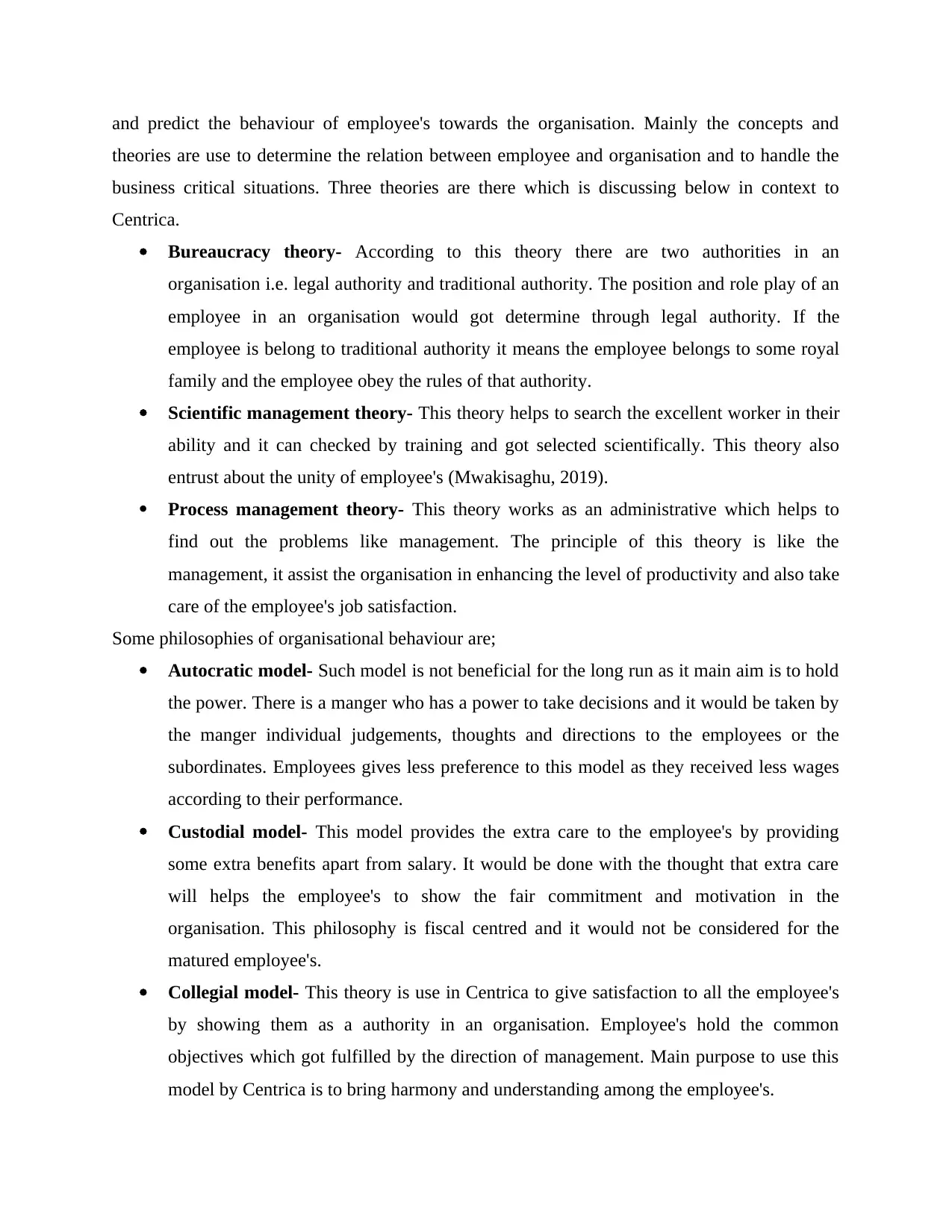
and predict the behaviour of employee's towards the organisation. Mainly the concepts and
theories are use to determine the relation between employee and organisation and to handle the
business critical situations. Three theories are there which is discussing below in context to
Centrica.
Bureaucracy theory- According to this theory there are two authorities in an
organisation i.e. legal authority and traditional authority. The position and role play of an
employee in an organisation would got determine through legal authority. If the
employee is belong to traditional authority it means the employee belongs to some royal
family and the employee obey the rules of that authority.
Scientific management theory- This theory helps to search the excellent worker in their
ability and it can checked by training and got selected scientifically. This theory also
entrust about the unity of employee's (Mwakisaghu, 2019).
Process management theory- This theory works as an administrative which helps to
find out the problems like management. The principle of this theory is like the
management, it assist the organisation in enhancing the level of productivity and also take
care of the employee's job satisfaction.
Some philosophies of organisational behaviour are;
Autocratic model- Such model is not beneficial for the long run as it main aim is to hold
the power. There is a manger who has a power to take decisions and it would be taken by
the manger individual judgements, thoughts and directions to the employees or the
subordinates. Employees gives less preference to this model as they received less wages
according to their performance.
Custodial model- This model provides the extra care to the employee's by providing
some extra benefits apart from salary. It would be done with the thought that extra care
will helps the employee's to show the fair commitment and motivation in the
organisation. This philosophy is fiscal centred and it would not be considered for the
matured employee's.
Collegial model- This theory is use in Centrica to give satisfaction to all the employee's
by showing them as a authority in an organisation. Employee's hold the common
objectives which got fulfilled by the direction of management. Main purpose to use this
model by Centrica is to bring harmony and understanding among the employee's.
theories are use to determine the relation between employee and organisation and to handle the
business critical situations. Three theories are there which is discussing below in context to
Centrica.
Bureaucracy theory- According to this theory there are two authorities in an
organisation i.e. legal authority and traditional authority. The position and role play of an
employee in an organisation would got determine through legal authority. If the
employee is belong to traditional authority it means the employee belongs to some royal
family and the employee obey the rules of that authority.
Scientific management theory- This theory helps to search the excellent worker in their
ability and it can checked by training and got selected scientifically. This theory also
entrust about the unity of employee's (Mwakisaghu, 2019).
Process management theory- This theory works as an administrative which helps to
find out the problems like management. The principle of this theory is like the
management, it assist the organisation in enhancing the level of productivity and also take
care of the employee's job satisfaction.
Some philosophies of organisational behaviour are;
Autocratic model- Such model is not beneficial for the long run as it main aim is to hold
the power. There is a manger who has a power to take decisions and it would be taken by
the manger individual judgements, thoughts and directions to the employees or the
subordinates. Employees gives less preference to this model as they received less wages
according to their performance.
Custodial model- This model provides the extra care to the employee's by providing
some extra benefits apart from salary. It would be done with the thought that extra care
will helps the employee's to show the fair commitment and motivation in the
organisation. This philosophy is fiscal centred and it would not be considered for the
matured employee's.
Collegial model- This theory is use in Centrica to give satisfaction to all the employee's
by showing them as a authority in an organisation. Employee's hold the common
objectives which got fulfilled by the direction of management. Main purpose to use this
model by Centrica is to bring harmony and understanding among the employee's.
Paraphrase This Document
Need a fresh take? Get an instant paraphrase of this document with our AI Paraphraser
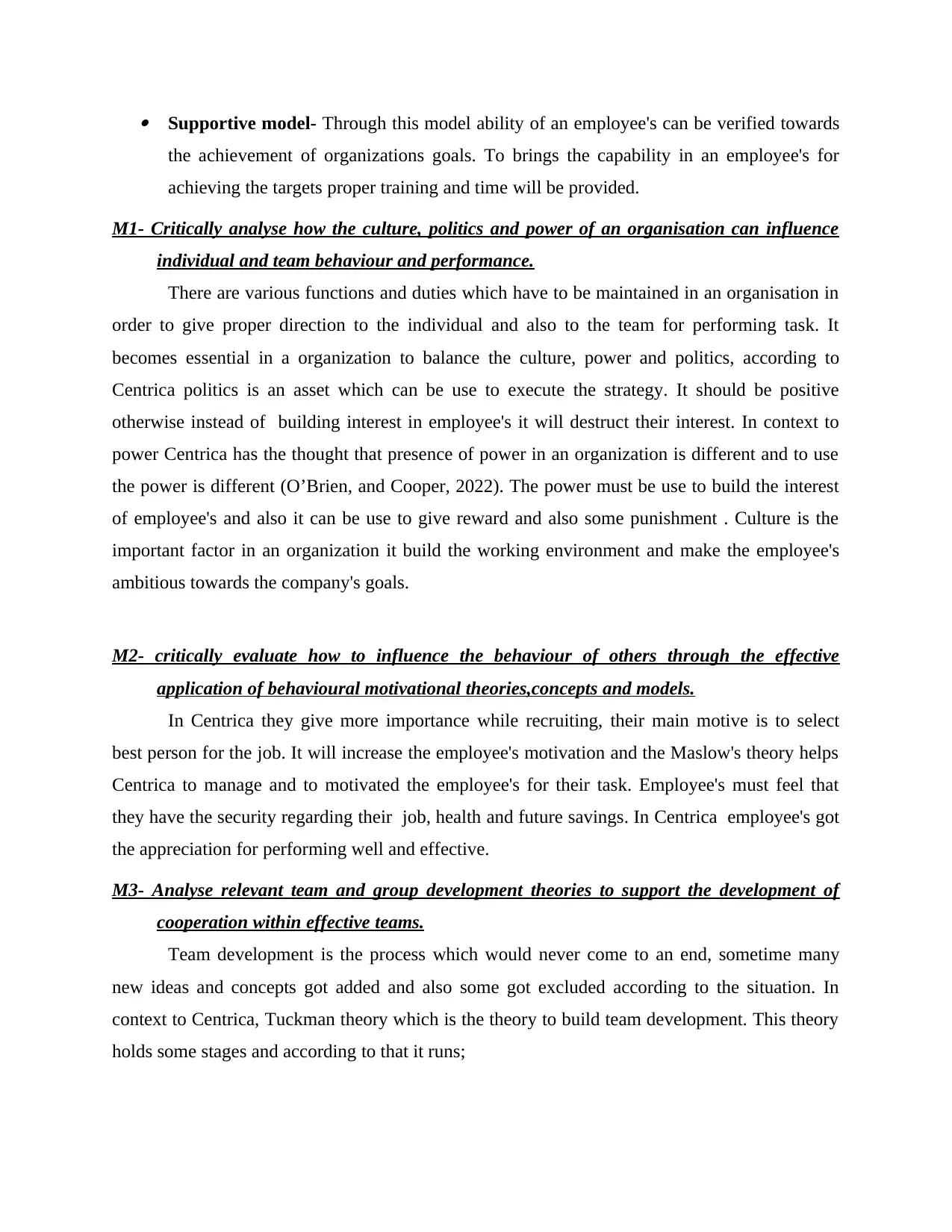
Supportive model- Through this model ability of an employee's can be verified towards
the achievement of organizations goals. To brings the capability in an employee's for
achieving the targets proper training and time will be provided.
M1- Critically analyse how the culture, politics and power of an organisation can influence
individual and team behaviour and performance.
There are various functions and duties which have to be maintained in an organisation in
order to give proper direction to the individual and also to the team for performing task. It
becomes essential in a organization to balance the culture, power and politics, according to
Centrica politics is an asset which can be use to execute the strategy. It should be positive
otherwise instead of building interest in employee's it will destruct their interest. In context to
power Centrica has the thought that presence of power in an organization is different and to use
the power is different (O’Brien, and Cooper, 2022). The power must be use to build the interest
of employee's and also it can be use to give reward and also some punishment . Culture is the
important factor in an organization it build the working environment and make the employee's
ambitious towards the company's goals.
M2- critically evaluate how to influence the behaviour of others through the effective
application of behavioural motivational theories,concepts and models.
In Centrica they give more importance while recruiting, their main motive is to select
best person for the job. It will increase the employee's motivation and the Maslow's theory helps
Centrica to manage and to motivated the employee's for their task. Employee's must feel that
they have the security regarding their job, health and future savings. In Centrica employee's got
the appreciation for performing well and effective.
M3- Analyse relevant team and group development theories to support the development of
cooperation within effective teams.
Team development is the process which would never come to an end, sometime many
new ideas and concepts got added and also some got excluded according to the situation. In
context to Centrica, Tuckman theory which is the theory to build team development. This theory
holds some stages and according to that it runs;
the achievement of organizations goals. To brings the capability in an employee's for
achieving the targets proper training and time will be provided.
M1- Critically analyse how the culture, politics and power of an organisation can influence
individual and team behaviour and performance.
There are various functions and duties which have to be maintained in an organisation in
order to give proper direction to the individual and also to the team for performing task. It
becomes essential in a organization to balance the culture, power and politics, according to
Centrica politics is an asset which can be use to execute the strategy. It should be positive
otherwise instead of building interest in employee's it will destruct their interest. In context to
power Centrica has the thought that presence of power in an organization is different and to use
the power is different (O’Brien, and Cooper, 2022). The power must be use to build the interest
of employee's and also it can be use to give reward and also some punishment . Culture is the
important factor in an organization it build the working environment and make the employee's
ambitious towards the company's goals.
M2- critically evaluate how to influence the behaviour of others through the effective
application of behavioural motivational theories,concepts and models.
In Centrica they give more importance while recruiting, their main motive is to select
best person for the job. It will increase the employee's motivation and the Maslow's theory helps
Centrica to manage and to motivated the employee's for their task. Employee's must feel that
they have the security regarding their job, health and future savings. In Centrica employee's got
the appreciation for performing well and effective.
M3- Analyse relevant team and group development theories to support the development of
cooperation within effective teams.
Team development is the process which would never come to an end, sometime many
new ideas and concepts got added and also some got excluded according to the situation. In
context to Centrica, Tuckman theory which is the theory to build team development. This theory
holds some stages and according to that it runs;
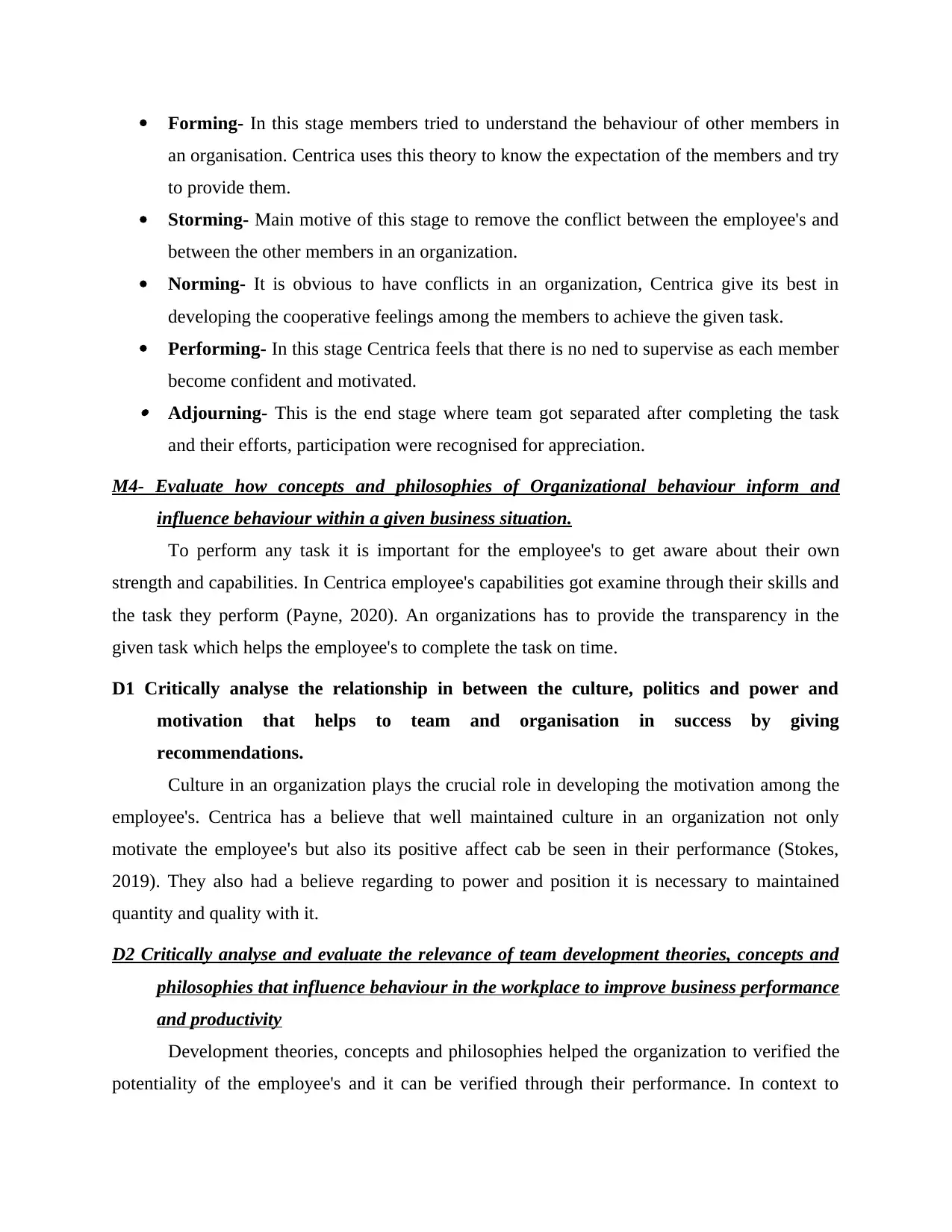
Forming- In this stage members tried to understand the behaviour of other members in
an organisation. Centrica uses this theory to know the expectation of the members and try
to provide them.
Storming- Main motive of this stage to remove the conflict between the employee's and
between the other members in an organization.
Norming- It is obvious to have conflicts in an organization, Centrica give its best in
developing the cooperative feelings among the members to achieve the given task.
Performing- In this stage Centrica feels that there is no ned to supervise as each member
become confident and motivated. Adjourning- This is the end stage where team got separated after completing the task
and their efforts, participation were recognised for appreciation.
M4- Evaluate how concepts and philosophies of Organizational behaviour inform and
influence behaviour within a given business situation.
To perform any task it is important for the employee's to get aware about their own
strength and capabilities. In Centrica employee's capabilities got examine through their skills and
the task they perform (Payne, 2020). An organizations has to provide the transparency in the
given task which helps the employee's to complete the task on time.
D1 Critically analyse the relationship in between the culture, politics and power and
motivation that helps to team and organisation in success by giving
recommendations.
Culture in an organization plays the crucial role in developing the motivation among the
employee's. Centrica has a believe that well maintained culture in an organization not only
motivate the employee's but also its positive affect cab be seen in their performance (Stokes,
2019). They also had a believe regarding to power and position it is necessary to maintained
quantity and quality with it.
D2 Critically analyse and evaluate the relevance of team development theories, concepts and
philosophies that influence behaviour in the workplace to improve business performance
and productivity
Development theories, concepts and philosophies helped the organization to verified the
potentiality of the employee's and it can be verified through their performance. In context to
an organisation. Centrica uses this theory to know the expectation of the members and try
to provide them.
Storming- Main motive of this stage to remove the conflict between the employee's and
between the other members in an organization.
Norming- It is obvious to have conflicts in an organization, Centrica give its best in
developing the cooperative feelings among the members to achieve the given task.
Performing- In this stage Centrica feels that there is no ned to supervise as each member
become confident and motivated. Adjourning- This is the end stage where team got separated after completing the task
and their efforts, participation were recognised for appreciation.
M4- Evaluate how concepts and philosophies of Organizational behaviour inform and
influence behaviour within a given business situation.
To perform any task it is important for the employee's to get aware about their own
strength and capabilities. In Centrica employee's capabilities got examine through their skills and
the task they perform (Payne, 2020). An organizations has to provide the transparency in the
given task which helps the employee's to complete the task on time.
D1 Critically analyse the relationship in between the culture, politics and power and
motivation that helps to team and organisation in success by giving
recommendations.
Culture in an organization plays the crucial role in developing the motivation among the
employee's. Centrica has a believe that well maintained culture in an organization not only
motivate the employee's but also its positive affect cab be seen in their performance (Stokes,
2019). They also had a believe regarding to power and position it is necessary to maintained
quantity and quality with it.
D2 Critically analyse and evaluate the relevance of team development theories, concepts and
philosophies that influence behaviour in the workplace to improve business performance
and productivity
Development theories, concepts and philosophies helped the organization to verified the
potentiality of the employee's and it can be verified through their performance. In context to
⊘ This is a preview!⊘
Do you want full access?
Subscribe today to unlock all pages.

Trusted by 1+ million students worldwide
1 out of 14
Related Documents
Your All-in-One AI-Powered Toolkit for Academic Success.
+13062052269
info@desklib.com
Available 24*7 on WhatsApp / Email
![[object Object]](/_next/static/media/star-bottom.7253800d.svg)
Unlock your academic potential
Copyright © 2020–2025 A2Z Services. All Rights Reserved. Developed and managed by ZUCOL.


